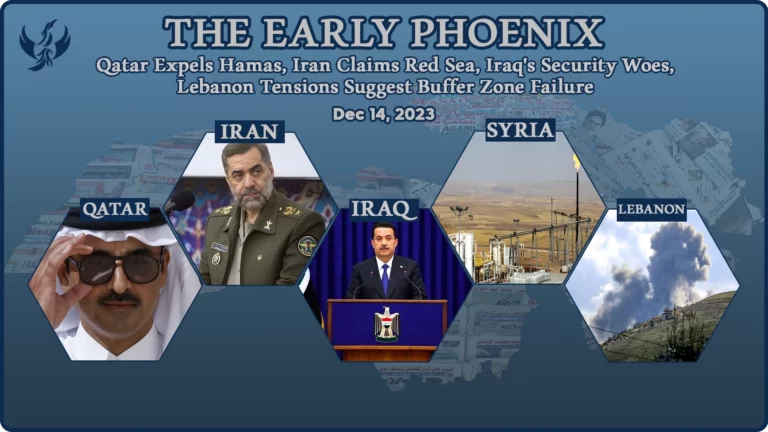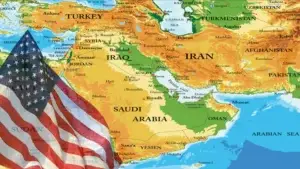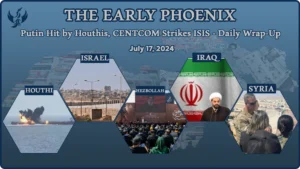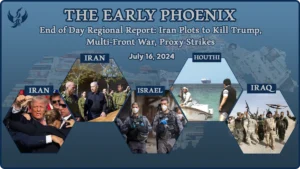Top 5 Headlines:
- Qatar Severs Ties with Hamas, Expels Officials.
- Iran Asserts Red Sea Control Amid Houthi Assaults.
- Iraq on High Alert: Elections and U.S. Withdrawal Talks.
- U.S. Response to Iranian Aggression in Syria Questioned.
- Hezbollah Aggression Raises Buffer Zone Questions.
======================
-
ISRAEL & PALESTINIAN TERRITORIES
- Israeli Forces Battle Hamas in Gaza, 70 Surrender. Israeli forces are engaged in intense battles with Hamas members in Shujaiya, Jabalia, and Khan Yunis regions, backed by the Israeli Air Force. The 460th Armored Brigade, with Shin Bet’s collaboration, successfully located a Hamas hideout near Kamal Adwan Hospital. Around 70 Hamas operatives have voluntarily surrendered, handing over weapons. They are undergoing interrogation by Shin Bet and Military Intelligence Directorate’s Unit 504. The conflict has resulted in casualties on both sides, with 444 Israeli officers and soldiers lost since hostilities began on October 7 last year. Gaza residents, including civilians, are affected by heavy shelling and bombing.
- Qatar Severs Ties with Hamas, Expels Officials. Hamas officials, including prominent figures like Ismail Haniyeh and Khaled Mashal, have recently left Qatar and severed their communication, relocating to countries such as Algeria, Lebanon, and Iran. Qatar, criticized by U.S. lawmakers for supporting Hamas, had become a base for the terrorist group since 2012. Saleh al-Arouri, another key Hamas leader in Lebanon, has also moved to Turkey, possibly in response to Israel’s vow to eliminate Hamas leadership worldwide. The recent shifts may be linked to heightened security concerns. Concurrently, Israel canceled the visit of Mossad director David Barnea to Qatar for negotiations related to a potential new hostage release deal in Gaza. The decision was made by Israel’s war cabinet, including Prime Minister Benjamin Netanyahu, and has led to concerns and demands for answers from the families of Israeli hostages. The negotiations involve American citizens among the hostages, with the United States and Qatar playing mediating roles.
- Are Palestinian Factions Shifting Towards a True Peace? Mahmoud Al-Aloul, Vice President of Fatah, hints at abandoning agreements with Israel, emphasizing the priority of ending bloodshed in Gaza and the West Bank. Fatah, under Palestinian President Mahmoud Abbas, grows weary of unfulfilled agreements and focuses on uniting Palestinians against ongoing violence. Meanwhile, Hamas, traditionally opposed to Israel’s recognition, shows signs of change. Mousa Abu Marzouk, a senior Hamas official, suggests in an Al-Monitor interview that Hamas might recognize Israel to cease the war in Gaza. This shift comes amidst international and Arab pressure following Hamas’ aggressive actions, including border incursions into Israel, resulting in significant casualties. Despite the PLO’s recognition of Israel in the 1993 Oslo Accords, Hamas has historically sought Israel’s destruction. However, recent Palestinian polls indicate growing support for Hamas, revealing a divide between West Bank and Gaza residents regarding their strategies.
- U.S. Withholds Rifles from Israel Amid Concerns Over Settler Violence. The Biden administration has delayed the shipment of over 27,000 rifles to the Israel Police, citing concerns about their potential use by extremist Israeli settlers. This decision follows reports of increased settler violence in Judea and Samaria. The U.S. demands assurance from Israel that these weapons will be strictly used by police forces. Israeli settlement leaders argue that this move represents an attempt by the U.S. to maintain a balanced stance, criticizing the notion of a settler violence surge as exaggerated and based on biased reporting. They also highlight the discrepancy in U.S. responses to Palestinian Arab violence, which they claim is significantly higher in comparison. The U.S. stance is seen by some Israeli leaders as a diplomatic strategy to demonstrate impartiality in the region. Concurrently, the UK bans entry for settlers linked to violence against Palestinians, seeking to hold Israel accountable for destabilizing actions.
======================
-
IRAN
- Iran Asserts Red Sea Control Amid Houthi Assaults. Iranian Defense Minister Mohammad Reza Ashtiani has issued a stark warning against the formation of a U.S.-backed multinational force to protect Red Sea navigation, emphasizing Iranian control over the region. This comes as Houthi rebels in Yemen escalate their activities in the Red Sea, creating a tense international situation. Their aggressive tactics include seizing an Israeli billionaire’s cargo ship, launching missile attacks on Red Sea-bound vessels, and attempting to intercept a European-bound chemical tanker. These actions have intensified maritime security concerns and led to direct confrontations with U.S., UK, and French naval forces. In response to these threats, the US Navy successfully thwarted a Houthi attempt to seize a Marshall Islands-flagged tanker in the Red Sea. The USS Mason destroyer intervened after a distress call, preventing the Houthi attack and neutralizing a drone launched by the rebels. Amidst these rising tensions, Israeli President Isaac Herzog has called for the formation of an international coalition to counter the Houthis’ threat to global navigation.
- Iran’s IRGC Conducts Extensive Military Exercises. Iran’s Islamic Revolution Guards Corps (IRGC) Ground Forces recently held large-scale military exercises in the western province, focusing on countering security threats. The drills included electronic warfare simulations, reconnaissance operations, and the deployment of drones and armored units. Additionally, the regular army’s air defense force received Karrar drones equipped with air-to-air Majid missiles, enhancing Iran’s air defense capabilities.
- Iran Bypasses US Sanctions; EU Sanctions Iran Over Drone Sales. The United States and the United Kingdom have imposed sanctions on individuals linked to Hamas and Islamic Jihad, freezing assets and banning travel to isolate these groups. This move coincides with the US Treasury Department targeting key officials for implementing Hamas’ violent actions abroad. Meanwhile, Iran, having accessed $10 billion from an Omani escrow account through sanctions waivers, faces criticism for the potential misuse of these funds. The Biden administration’s perceived lenient enforcement of sanctions against Iran has led to a significant increase in its oil revenue. China’s involvement in purchasing Iranian oil and the operation of Iran’s “ghost fleet” of oil tankers, which bypass US sanctions, exacerbate concerns. Additionally, the European Union has sanctioned six individuals one of which is Isamail Qaani, the leader of the IRGC and five Iranian companies for supplying drones to Russia, further illustrating Iran’s deviation from international standards. Lawmakers are urging for stronger sanctions enforcement and the implementation of advanced technology to track and curb Iran’s illicit financial activities. The UK’s sanctions on key Iranian figures, including a travel ban and asset freeze, aim to curb human rights abuses and destabilize activities. These measures symbolize global disapproval and aim to isolate the sanctioned individuals internationally.
- Iran Faces Bread Crisis Amid Economic Woes; Channels Funds to Expand Radiopharmaceuticals. As Iran grapples with a severe bread affordability crisis, highlighted by Economy Minister Ehsan Khandouzi, the government’s focus seems misaligned. Iranians struggle with a 50% inflation rate, making basic necessities like bread unaffordable, while the government proposes only a 20% pay raise for civil servants, inadequate in addressing the 50% budget deficit. Concurrently, amidst these economic hardships and rising public unrest, Iran’s nuclear chief, Mohammad Eslami, announces a significant expansion in radiopharmaceutical production. This move raises questions about the allocation of funds, especially considering recent accesses to $10 billion under sanction waivers, purportedly for humanitarian purposes, yet seemingly diverted to areas like petrochemical advancement rather than addressing the pressing needs of its population.
- Exiled Iranian Prince Alarmed Over Political Prisoner’s Safety. Prince Reza Pahlavi expresses concern for political prisoner Zohreh Sarv, fearing for her life after a reported suicide attempt. Pahlavi holds the Islamic Republic responsible and calls for international pressure on Iran to release not only Sarv but all political prisoners. Sarv, on hunger strike in Evin Prison, protests rights violations and faces continued legal challenges.
- Iran Calls for Global Support in Hosting Afghan Refugees. Iranian Foreign Minister Hossein Amirabdollahian urges international assistance for Afghanistan’s infrastructure development to facilitate the return of Afghan refugees. Speaking at the Global Refugee Forum in Geneva, he emphasizes the unequal distribution of refugee responsibilities and the strain on Iran’s resources, hosting over 5 million Afghan refugees amid economic sanctions.
- Second Iranian Official Faces Deportation from Canada Under Sanctions. Canada initiates deportation proceedings against Iranmanesh Majid, the second alleged senior Iranian official discovered residing in the country. The case, under Canadian sanctions prohibiting senior Iranian government members, is part of efforts to remove individuals associated with the Iranian regime. The move follows a similar case involving Seyed Salman Samani.
======================
-
IRAQ
- Iraq on High Alert: Elections and U.S. Withdrawal Talks. Iraq is currently navigating a complex array of security challenges. The spokesperson for the Iraqi Armed Forces has acknowledged that the recent assaults on the U.S. Embassy and National Security Agency’s headquarters constitute grave threats to the nation’s sovereignty and security. In response to these escalating tensions, Prime Minister Muhammad Shia’ al-Sudani has heightened Iraq’s military readiness to Alert Level (C), the most severe state of alert, which will remain in effect until December 20. This heightened alert is not only a reaction to the recent attacks on U.S. sites but also a precautionary measure in anticipation of local elections scheduled for December 18. The ongoing discussions regarding the withdrawal of American troops are gaining urgency in light of more than 92 attacks on American forces since mid-October. These discussions are deeply influenced by the broader geopolitical landscape, particularly the U.S. position on the conflict in Gaza.
- U.S. Supports Iraq with Cash Shipments for 2024, Bolstering Banking System. The Central Bank of Iraq has announced that the United States, through the Federal Reserve and the US Treasury Department, has agreed to provide Iraq with cash dollar shipments for the year 2024. This decision follows productive meetings in Dubai, where U.S. representatives recognized the efforts of the Central Bank of Iraq in achieving compliance with international banking standards in 2023. The agreements will aid in supporting Iraqi banks, establishing relationships with correspondent banks, and transitioning towards enhanced balance of accounts. These measures are part of Iraq’s plan to gradually reduce reliance on the electronic platform and focus on financial transfer processes for control, auditing, and analysis. This U.S. support is a significant step in strengthening the Iraqi banking system and preparing it for adherence to international practices.
- Iraqi Forces Destroy Three ISIS Sites in Makhoul Mountains. The General Directorate of Intelligence and Security in Iraq has successfully conducted operations against the ISIS terrorist organization in the Makhoul Mountains. Following accurate intelligence and surveillance of terrorist movements, the Salah al-Din Operations Command’s artillery brigades destroyed three ISIS positions. The operation also targeted solar panels used by the terrorists and disrupted their transportation routes in the region. This action is part of ongoing efforts to combat ISIS’s presence and activities in Iraq.
======================
-
SYRIA
- U.S. Response to Iranian Aggression in Syria Questioned. Today, Iranian factions escalated their interconnected aggression in Syria by launching missiles from western Euphrates-controlled areas, targeting a coalition base in Deir ez-Zor. The International Coalition’s air defense system successfully thwarted this attack, intercepting a drone and multiple missiles, thus safeguarding the Koniko oil field from harm. While around five missiles landed near the Koniko field, there were no reported damages. In response, international coalition forces patrolled the Euphrates River, underscoring the persistent Iranian threat in the region. Simultaneously, Arab tribal fighters in Deir ez-Zor intensified their attacks on SDF checkpoints and military positions, reflecting a broader Iranian initiative to confront the United States in Syria using both their own militias and Arab Sunni militias.
- Resumption of Algerian Flights Sparks Illegal Immigration Concerns to Europe. The Algerian Ministry of Transport’s decision to resume flights to Syria and Lebanon may herald the resurgence of illegal immigration to Europe. After years of severed air connections, this development could pave the way for individuals in Syria and Lebanon seeking alternative routes to Europe, potentially reviving the flow of undocumented migrants. As flights gradually increase, the implications for Europe’s immigration landscape may become increasingly pronounced, necessitating vigilance and preparedness in addressing potential challenges associated with irregular migration.
- Jordan’s Diplomatic Strategy: Tackling Syrian Drug Threats with Iran. Jordan’s diplomatic efforts, led by Foreign Minister Ayman Al-Safadi in his meeting with Iranian counterpart Hossein Amir Abdollahian, reflects a direct response to the complex drug and weapon smuggling from Syria. This meeting signifies Jordan’s awareness and proactive approach to counter Iran’s expanding control in the Levant region. Iran’s strategy of indirect warfare, leveraging tactics like drug and weapon trafficking, poses a multifaceted threat to regional stability. Jordan’s engagement with Iran is a critical step in confronting these covert forms of aggression and asserting control over the security dynamics within its borders and the broader Middle Eastern landscape.
- Syria’s Shadow War: A Resurgence of Assassinations or a Regime’s Self-Purge? The mysterious deaths of high-ranking officers in Assad’s regime, including Brigadier General Munther Samaha, suggest a potential resurgence of targeted assassinations or, alternatively, a deliberate purge by the regime itself. The increasing incidents of killings, bombings, and attacks, shrouded in secrecy and lacking official acknowledgment, raise questions about the regime’s motives. Is this a tactic to eliminate witnesses to crimes committed since 2011, or a reflection of escalating internal conflicts? The pattern of fatalities among Assad’s militias, especially in strategic regions, hints at a complex, covert operation possibly rooted in the regime’s efforts to control the narrative and consequences of its long-standing actions against the Syrian people.
- Celebrating Christmas in Hassakeh: Amid Challenges, Syrians Find Joy. Despite 12 years of military conflicts and enduring challenges, Syrians in Hassakeh cherish rare moments of joy during festive seasons like Christmas. The province reflects cultural diversity and peaceful coexistence, with residents striving to reclaim moments of happiness amid the political and economic crisis in Syria.
======================
-
THE GULF REGION & YEMEN
- Saudi Arabia Chosen to Chair IMF’s Monetary Affairs Committee. .The International Monetary Fund (IMF) has selected the Kingdom of Saudi Arabia to chair its International Monetary and Financial Affairs Committee. Saudi Finance Minister Mohammed Al-Jadaan will lead the committee from 2024 to 2027. This committee plays a crucial role in supporting the IMF Board of Governors, overseeing the global monetary and financial system, and addressing emerging issues that could disrupt the system. The appointment of Saudi Arabia signifies recognition of its global and regional leadership and its key role in enhancing international multilateral actions.
- High-Level U.S. and NATO Visits to Saudi Arabia Highlight Strategic Regional Role. Saudi Arabia is increasingly pivotal for the U.S. and NATO due to its role in fostering peace in the Middle East, particularly in the Israeli-Palestinian conflict, and its potential as a stabilizing force in the region. Discussions between Saudi Crown Prince Mohammed bin Salman and U.S. National Security Advisor Jake Sullivan have focused on creating conditions for sustainable peace between Israelis and Palestinians and humanitarian aid in Gaza. NATO Secretary-General Jens Stoltenberg’s visit to Riyadh, the first of its kind, underscores the desire to deepen NATO’s cooperation with Saudi Arabia. These developments highlight Saudi Arabia’s critical role in regional security, stability, and its influence in bridging gaps between Western and Gulf diplomatic and security interests, especially in light of ongoing conflicts in the region.
- Bahrain Confronts Iranian Legal Claim for $1.7 Billion as Tehran Seeks Funds Globally. Iran plans to start legal action over Bahrain’s debts exceeding $1.7 billion. The Assistant to the Iranian President for Legal Affairs has announced Tehran’s preparedness to pursue a lawsuit immediately. The action is based on an investment agreement that allows arbitration in cases where Iranian investors are impacted. The claims involve a major case related to the Central Bank and a minor insurance lawsuit. This development occurs as Bahrain-Iran relations gradually improve, in line with the recent restoration of Saudi-Iranian ties. In the context of U.S. and British sanctions and global scrutiny over Iran’s actions, Iran’s chances of a favorable verdict in its legal claim against Bahrain may be hindered. While Iran prepares for international legal action, the outcome could be influenced by the current geopolitical climate, making the process complex and uncertain.
======================
-
EGYPT
- Navigating Turbulent Waters: Egypt’s Balancing Act in the Israeli-Gaza Conflict. Despite the escalation of Houthi attacks in the Red Sea, assurances from Egyptian experts and officials suggest the Suez Canal’s security remains robust. Major General Nasr Salem, alongside Dr. Muhammad Daoud, underscores the effectiveness of American and multinational CTF forces in safeguarding the Canal. While potential disruptions to shipping through the Bab al-Mandab Strait are acknowledged, the primary target of these threats are Israeli ships, which do not typically traverse the Suez Canal.
Israel’s decision to increase gas exports to Egypt by 500 million cubic meters annually, although not publicly declared, strengthens economic ties between the two nations. This move signifies a deepening of geopolitical relations amidst regional tensions, offering economic benefits like increased tax revenue and foreign currency influx for Israel, while securing a steady gas supply for Egypt. However, a leaked audio recording from Reporters Without Borders sheds light on another aspect of Egypt-Israel relations. It reveals Egypt’s efforts to block journalist access to Gaza, potentially to maintain favorable relations with Israel and manage regional dynamics.
The economic implications of the Gaza conflict on neighboring Arab countries, including Egypt, are significant. A UN study forecasts a substantial financial toll, with potential losses of $10.3 billion or 2.3 percent of the collective GDP of Lebanon, Egypt, and Jordan. This economic strain underlines the necessity for Egypt to navigate its diplomatic and economic relations carefully, particularly with Israel, to mitigate potential economic fallout and maintain regional stability.
======================
-
TURKIYE
- Turkish Politics in Turmoil: Confronting U.S. Policy and Internal Divisions on Israel-Palestine. The Turkish Parliament Speaker’s condemnation of the U.S. for vetoing a Gaza ceasefire resolution, labeling America as complicit in “Israeli massacres,” mirrors Turkey’s strong opposition to Israeli actions in Gaza and perceived U.S. support. This reflects Turkey’s increasingly firm stance on Palestine and growing foreign policy rifts, particularly with the U.S. and Israel. The death of a Turkish lawmaker from the Happiness Party, after a speech criticizing the government’s Israel ties, further underscores the intense and polarized nature of Turkey’s internal political debates. These incidents highlight how the Israel-Hamas War has significantly heightened political discourse in Turkey, impacting both its foreign policy orientation and domestic political environment.
- Is Russia Using Turkey’s Gaza Stance to Boost Its Middle East Clout? Russia’s alignment with Turkey in addressing the Gaza crisis may be part of a broader strategy to expand its influence in the Middle East. By supporting Erdogan’s efforts towards peace in Gaza and aligning with Turkey’s stance on the Israel-Hamas conflict, Russia appears to be leveraging Turkey’s regional position to bolster its own strategic ambitions in the Middle East. This partnership not only highlights Russia’s support for Erdogan’s initiatives but also suggests a tactical approach by Russia, using Turkey’s involvement to strengthen its foothold in the region. The planned meeting between Putin and Erdogan further cements this alliance, underlining Russia’s intent to utilize Turkey’s influence in shaping Middle Eastern dynamics.
- Turkey’s Balancing Act Between Azerbaijan and Russia. Turkey is skillfully navigating its foreign relations by strengthening ties with Azerbaijan while maintaining a strategic relationship with Russia. Azerbaijani Foreign Minister Jeyhun Bayramov’s recent declaration of a ‘historic peak’ in relations with Turkey, particularly after the 2021 Shusha Declaration, underscores the deepening political, economic, and military cooperation between Ankara and Baku. This burgeoning partnership, however, is balanced by Turkey’s ongoing engagement with Russia, a key regional player.
- Turkey’s Dual Defense Strategy: Domestic Innovation and Foreign Procurement. Turkey is showcasing its military prowess through domestic innovations like the Boran howitzer, while simultaneously seeking advanced technology like U.S. F-16 jets. The Boran’s success exemplifies Turkey’s commitment to self-reliance and technological advancement in defense. However, the pursuit of F-16s reflects a desire to incorporate established military technology and maintain strong NATO alliances. This strategy underscores Turkey’s aim to be a robust military force, balancing homegrown developments with strategic international partnerships.
======================
-
LEBANON
- Hezbollah Aggression Raises Buffer Zone Questions. Hezbollah’s actions, including the targeting of Israeli soldiers and the announcement of a member’s death, signal an escalation in its conflict with Israel. This intensification follows a series of IDF strikes on Hezbollah sites in Lebanon, in retaliation to rocket and missile attacks. With the IDF having attacked over 110 terror squads since the onset of the war, both sides are deeply engaged in intensive military operations. Israel remains on high alert, and Hezbollah’s continued offensive actions point towards further escalation. Given these ongoing military escalations and Hezbollah’s active operations, it seems improbable that Hezbollah would endorse a buffer zone initiative that aims to de-escalate tensions with Israel. Their ongoing aggressive military engagements suggest a preference for maintaining the current level of conflict.
- Cabinet Expected to Approve Aoun’s Term Extension, Hezbollah and PSP to Abstain. The Lebanese Cabinet is set to address the extension of Army chief General Joseph Aoun’s term during its Friday session. The extension is likely to be approved, with Hezbollah and the Progressive Socialist Party expected to abstain from voting. However, this approval may face legal challenges, with indications that the Free Patriotic Movement might appeal the decision before the State Shoura Council.
======================
📌 Incase you missed it,
📰 THE EARLY PHOENIX December 13, 2023
📰 THE EARLY PHOENIX December 12, 2023
🌍 The Region December 11, 2023
🌍 Israel
🌍 Iran
🌍 Turkiye
🌍 SYRIA
✒️ Listen to the Voice of the People Latest:
🔗 After October 7, is Jordan in Tehran’s Crosshairs?
🔗 Follow the latest news from the American Center for Levant Studies via Google News
======================




